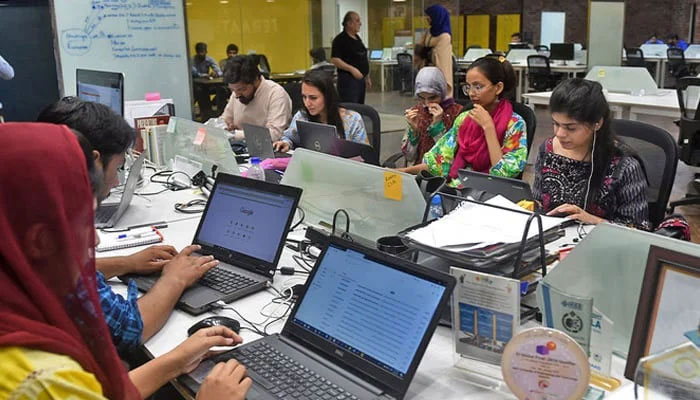Women take the lead in urban consumer spending
LAHORE: Pakistan’s private sector has increasingly recognised the vital role of women in domestic commerce, with women emerging as the primary consumer force, particularly in urban centres where large numbers of middle-class families reside.
Women are now the main drivers of consumer spending. Until recently, businesses in Pakistan failed to leverage insights into their evolving value calculus. Women research their purchases meticulously and have become a formidable force over the past three decades across all major cities. Universities in Pakistan have also produced more female graduates and postgraduates than male during this period, further strengthening their influence. Women now control nearly 75 per cent of discretionary spending in urban areas, where 37 per cent of the population lives. These urban centres, however, account for over 70 per cent of total consumer spending.
Interestingly, it was a woman from the textile sector who first recognised Pakistani women’s sharp instincts for value. She introduced fabric with varied embroidery, sparking what has become Pakistan’s thriving fashion industry. Today, textile entrepreneurs target women not only to market women’s fabrics but also to sell home textiles such as bed linen, curtains, and upholstery. Pakistani women have proven their discernment by swiftly rejecting flawed products and rewarding high-quality offerings with substantial orders.
In major cities like Karachi, Lahore and Islamabad, around 15 per cent of women now earn more than their spouses. Women have also gained significant influence in purchasing decisions for cars and electronics, and they are the primary buyers of the latest smartphones. This trend, however, has yet to spread to rural areas, where men still dominate consumer spending. Moreover, the consumption of value-added goods and electronics remains low in rural communities, which are divided between the affluent and the poor.
Generally, middle-class women work diligently to maintain a rich, balanced lifestyle without overindulging. As the first generation to experience modern luxuries, they strive to maximise their limited resources. They plan their shopping carefully and use savvy tactics to secure the best possible deals, ensuring they save some money even after enjoying a comfortable lifestyle.
Middle-class women have also emerged as the most stable and reliable consumers. Most working middle-class women remain unaffected by economic downturns because they are employed in protected or essential sectors such as education, healthcare, retail, and services, where job security is higher. In contrast, male-dominated industries like construction, real estate, and financial services are typically hit hard during economic recessions.
Although many products are now designed with women’s preferences in mind, the overall shopping experience remains marred by retailers’ indifferent attitudes. Retailers often quote unreasonably high prices when dealing with female customers, who are then forced to bargain to obtain fairer rates. Pakistan’s domestic commerce cannot reach its full potential unless retailer credibility is improved.
This is why middle-class women consumers are increasingly turning to branded stores, where prices are fixed and quality is assured. In response, all major brands in Pakistan have expanded their presence by opening outlets in the prime shopping districts of every city.
-
 Columbia University Sacks Staff Over Epstein Partner's ‘backdoor’ Admission
Columbia University Sacks Staff Over Epstein Partner's ‘backdoor’ Admission -
 Ozzy Osbourne's Family Struggles Behind Closed Doors
Ozzy Osbourne's Family Struggles Behind Closed Doors -
 Dua Lipa Claims Long-distance Relationship 'never Stops Being Hard'
Dua Lipa Claims Long-distance Relationship 'never Stops Being Hard' -
 BTS Moments Of Taylor Swift's 'Opalite' Music Video Unvieled: See Photos
BTS Moments Of Taylor Swift's 'Opalite' Music Video Unvieled: See Photos -
 Robin Windsor's Death: Kate Beckinsale Says It Was Preventable Tragedy
Robin Windsor's Death: Kate Beckinsale Says It Was Preventable Tragedy -
 Rachel Zoe Shares Update On Her Divorce From Rodger Berman
Rachel Zoe Shares Update On Her Divorce From Rodger Berman -
 Kim Kardashian Officially Takes Major Step In Romance With New Boyfriend Lewis Hamilton
Kim Kardashian Officially Takes Major Step In Romance With New Boyfriend Lewis Hamilton -
 YouTube Tests Limiting ‘All’ Notifications For Inactive Channel Subscribers
YouTube Tests Limiting ‘All’ Notifications For Inactive Channel Subscribers -
 'Isolated And Humiliated' Andrew Sparks New Fears At Palace
'Isolated And Humiliated' Andrew Sparks New Fears At Palace -
 Google Tests Refreshed Live Updates UI Ahead Of Android 17
Google Tests Refreshed Live Updates UI Ahead Of Android 17 -
 Ohio Daycare Worker 'stole $150k In Payroll Scam', Nearly Bankrupting Nursery
Ohio Daycare Worker 'stole $150k In Payroll Scam', Nearly Bankrupting Nursery -
 Michelle Yeoh Gets Honest About 'struggle' Of Asian Representation In Hollywood
Michelle Yeoh Gets Honest About 'struggle' Of Asian Representation In Hollywood -
 Slovak Fugitive Caught At Milano-Cortina Olympics To Watch Hockey
Slovak Fugitive Caught At Milano-Cortina Olympics To Watch Hockey -
 King Charles Receives Exciting News About Reunion With Archie, Lilibet
King Charles Receives Exciting News About Reunion With Archie, Lilibet -
 Nvidia Expands AI Infrastructure With Nevada Data Centre Lease
Nvidia Expands AI Infrastructure With Nevada Data Centre Lease -
 Royal Family Shares Princess Anne's Photos From Winter Olympics 2026
Royal Family Shares Princess Anne's Photos From Winter Olympics 2026




